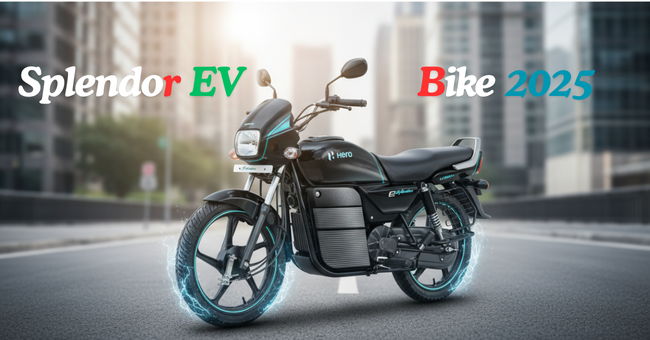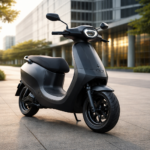

Splendor EV Bike – The Electric Future of India’s Favourite Commuter
The Splendor EV Bike is quickly becoming one of the most talked-about topics in India’s two-wheeler industry. As the world moves toward electric mobility, Hero’s iconic Splendor is expected to make a powerful comeback in an all-new electric avatar. But what exactly is the Splendor EV bike? What will be its price, range, and features? And why is it being called the future of affordable mobility?
In this article, we’ll explore every detail of the Hero Splendor Electric Bike, including its design expectations, performance, charging system, and launch updates — all in simple, easy language. Whether you’re a daily commuter or someone curious about electric vehicles, this guide will help you understand what makes the Splendor EV such an exciting innovation in India’s electric mobility landscape.
1. Introduction – The Idea Behind the Splendor EV Bike
The Splendor EV Bike represents a major step forward in Hero MotoCorp’s journey toward sustainable mobility. For decades, the Splendor has been the go-to motorcycle for Indian commuters — known for reliability, fuel efficiency, and low maintenance.
Now, with increasing fuel prices and growing environmental awareness, Hero is ready to transform its best-selling commuter into an electric version — the Splendor EV. This upcoming model aims to provide the same comfort, durability, and affordability as the petrol version, but with the added advantage of zero emissions and minimal running costs.
Electric bikes are no longer just for tech lovers — they’re fast becoming the practical choice for urban and semi-urban riders. And if Hero manages to blend its proven engineering with EV innovation, the Splendor EV could easily dominate India’s electric two-wheeler segment.
2. Design & Style – Classic Look, Modern Touch
The design of the Splendor EV Bike is expected to retain its iconic silhouette — the same commuter-friendly structure that millions of riders trust. However, Hero will likely give it a futuristic twist with:
- Sleek LED headlamps and DRLs for modern appeal
- A digital instrument cluster showing battery percentage, speed, and range
- Improved aerodynamics for better energy efficiency
- Durable body panels designed for lighter weight
Hero knows that Splendor’s charm lies in its simplicity. Therefore, instead of radical design changes, the EV model will probably maintain the same user-friendly look with subtle modern updates.
3. Motor & Performance – Smooth and Silent Power
While official specifications haven’t been confirmed yet, early expectations suggest the Hero Splendor EV Bike will come equipped with:
- A brushless DC motor (BLDC) offering smooth acceleration
- Peak power output around 5–7 kW, suitable for daily rides
- A top speed of about 80–90 km/h, enough for city commuting
- Torque delivery that’s instant and responsive, unlike petrol engines
Electric bikes offer one major advantage — instant torque. The Splendor EV will likely provide quicker starts and a much smoother riding experience, ideal for Indian traffic conditions.
4. Battery & Range – Affordable, Efficient, and Reliable
One of the biggest deciding factors for any electric vehicle is range. The Splendor EV Bike is expected to deliver a real-world range of 120–150 km per charge, making it one of the most practical options in its segment.
Hero is likely to use a lithium-ion battery pack with fast-charging capabilities. Riders can expect:
- Charging time of 3–4 hours (standard)
- Fast charging option (up to 80% in 1.5 hours)
- Removable battery for easy home or office charging
Hero could also provide battery swapping options through its service network, helping riders avoid downtime and range anxiety.
5. Features & Technology – Smart, Connected, and User-Friendly
The Splendor EV isn’t just about being electric; it’s about being smart. The company may integrate advanced features such as:
- Bluetooth connectivity for smartphone pairing
- Hero Connect app for remote monitoring of battery and location
- Regenerative braking system for better efficiency
- Ride modes – Eco, Normal, and Power
- Digital speedometer and trip data
With these upgrades, the Splendor EV aims to offer an advanced riding experience without compromising on the simplicity that made the original Splendor iconic.
6. Price Expectations – Made for the Indian Rider
Affordability has always been the Splendor’s biggest strength. Hero understands that electric mobility must remain accessible to India’s middle class.
The expected price of the Splendor EV Bike could be between ₹90,000 and ₹1.20 lakh (ex-showroom), depending on variants and features. Government EV subsidies and state-level incentives will make it even more affordable.
Compared to other electric bikes like the Revolt RV400 or TVS iQube, the Splendor EV’s pricing strategy could attract a large number of first-time EV buyers.
7. Launch Date & Market Availability
Hero MotoCorp has already announced partnerships with several EV technology companies and battery innovators. The Splendor EV Bike is currently in advanced development and could launch in India by mid-2025.
Initially, it may be available in metro cities and Tier-1 towns, followed by a nationwide rollout. Given Hero’s extensive dealership network, the Splendor EV is expected to reach even small towns faster than most competing EV brands.
8. Why Splendor EV Could Change India’s Commuter Market
The Splendor EV could become the turning point in India’s electric mobility story for several reasons:
Brand Trust – Splendor is already India’s most trusted commuter name.
Mass Affordability – Hero knows the Indian buyer better than anyone.
Wide Service Network – Easy availability of service and parts.
Practical Range – Enough for daily rides and office commutes.
Hero’s EV Strategy – Long-term plans for charging stations and connected services.
If these expectations are met, the Splendor EV will not only bring Hero into the EV race but also set new standards for budget-friendly electric commuting.
9. Competitors & Alternatives
The electric two-wheeler market in India is growing rapidly. Once launched, the Splendor EV Bike will compete with:
- Revolt RV400 – known for performance and AI features
- TVS iQube – offering smart connectivity and reliability
- Bajaj Chetak Electric – stylish and retro-modern design
- Ola S1 Air – fast acceleration and high-tech features
However, Hero’s focus will likely be on practical usability rather than flashy tech. This focus on everyday riders could help the Splendor EV stand out as the most trusted EV bike for the masses.
10. Hero’s EV Vision and the Future of Two-Wheeler Mobility
Hero MotoCorp has already invested heavily in electric vehicle development through its collaborations with Ather Energy and other tech firms. The company’s long-term vision includes building a complete EV ecosystem — from batteries to charging networks.
The Splendor EV is expected to be the first of many models in Hero’s new lineup. Once launched, it could open the door for affordable electric bikes and scooters built for Indian roads, climate, and user habits.
This transition also reflects the future of India’s two-wheeler market — from petrol to electric, without compromising trust, performance, or reliability.
11. Benefits of Owning a Splendor EV Bike
- Zero fuel cost – Charge at home for just a few rupees per day.
- Low maintenance – No oil changes, clutch, or gearbox wear.
- Environment-friendly – No exhaust emissions, reduced pollution.
- Smooth and quiet ride – Instant torque and low vibrations.
- Government subsidies – FAME-II and state incentives reduce cost.
- Future-ready investment – Stay ahead as cities shift to EVs.
Owning a Splendor EV Bike won’t just save money — it’ll contribute to a cleaner, greener India.
Final Thoughts – The Legacy Continues Electrically
The Hero Splendor EV Bike has the potential to redefine the commuter category in India. Combining Hero’s engineering expertise with modern EV technology could deliver a perfect blend of comfort, affordability, and innovation.
For millions of riders who have relied on Splendor for decades, this electric version represents not just a new product — but a continuation of a trusted legacy, powered by the future.
If Hero delivers what it promises, the Splendor EV could very well become India’s first truly mass-adopted electric motorcycle.
The Porsche Taycan EV marks a significant milestone in India’s electric vehicle landscape. Complementing this, the Tata Nano EV is generating buzz with its anticipated launch, promising an affordable entry into electric mobility. For budget-conscious consumers, exploring electric cars under ₹5 lakh offers a range of options without compromising on quality. Additionally, the BMW i3 is set to redefine urban electric driving with its compact design and advanced features. Together, these developments highlight the diverse and evolving EV market in India.
If you love staying updated with the latest automobile news, reviews, and electric vehicle updates, Carblogs is your go-to destination. Explore real-world insights, car and bike comparisons, and expert guides crafted to help you make smart buying decisions.
👉 Visit Carblogs.in today and stay ahead in the world of electric mobility!
1. What is the Splendor EV Bike?
The Splendor EV Bike is the upcoming electric version of Hero’s popular Splendor commuter motorcycle, designed for efficiency and zero emissions.
2. What will be the expected range of the Splendor EV?
It’s expected to offer a range of around 120–150 km per full charge, depending on riding conditions.
3. What is the price of the Splendor EV Bike in India?
The estimated price is ₹90,000–₹1.20 lakh (ex-showroom), which could go lower with government subsidies.
4. When will the Splendor EV Bike launch in India?
Hero is expected to launch it by mid-2025, starting in metro and major cities.
5. Will the Splendor EV have fast charging?
Yes, the EV will likely support fast charging — 0–80% in around 1.5 hours.
6. What are the main benefits of using the Splendor EV?
Low running cost, zero emissions, minimal maintenance, and a smooth, quiet ride make it a great everyday option.
7. Is the Splendor EV good for long rides?
While primarily designed for daily commuting, a 120+ km range makes it capable of short highway trips too.
8. Where can I buy or book the Splendor EV Bike?
Once launched, bookings will be available through Hero MotoCorp dealerships and official online platforms.
Add a comment Cancel reply
Comments (0)
Mahindra XUV 3XO 2025 Launch: Hybrid SUV for Indian Cities
[…] Hustler EV is aimed at eco-conscious buyers looking for zero-emission vehicles, similar to the Splendor EV Bike in two-wheeler EV segment. It offers smooth acceleration, regenerative braking, and modern EV […]
Porsche Taycan EV – Price, Range, Specs & Review 2025 | Carblogs
[…] evolving rapidly, with exciting options for every budget and preference. Popular choices like the Hero Splendor Electric Bike offer affordable and efficient two-wheeler solutions, while the Tata Nano EV Launch Date has […]
Categories
- Article (221)
- Auto Detailing (1)
- Bike News (89)
- Bike Reviews (30)
- Car News (192)
- Car Reviews (14)
Recent Posts
About us

Related posts


Jawa Neo Retro 730 Twin, 730cc Twin Cylinder, 75 BHP, 68 Nm


Contessa Car Complete Guide to Price, Specifications and Legacy


European Car Brands in India Complete Guide to Luxury, Imports and Price Trends









